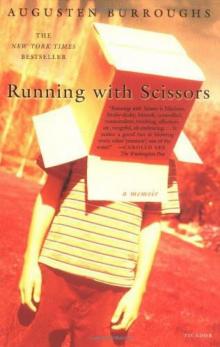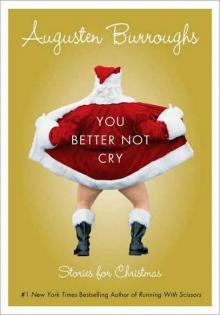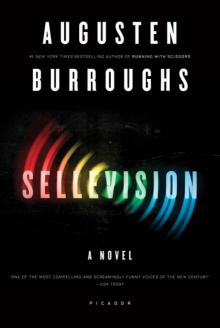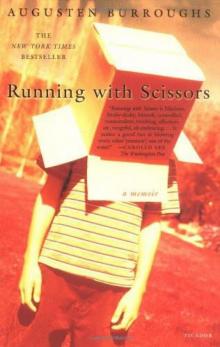- Home
- Augusten Burroughs
Magical Thinking Page 3
Magical Thinking Read online
Page 3
The tour guide pointed to a painting of Cornelius Vanderbilt hanging above a fireplace that was larger than our car. I studied him closely, and it was like looking into a mirror.
How did they do it, I wondered? My parents, how did they snatch me? Was I playing outside alone, perhaps chasing one of our peacocks, while my mother was taking a bath in the marble tub? Had she told me never to leave the house, but at the young age of three or four I simply didn’t understand? Or had they done it sooner, when I was a baby? I had no way of knowing, as I could remember nothing of my life until the age of five.
My first memory is of the pyramid of the moon in Mexico City. I was there with my mother, who had taken me on a trip. Thinking back, it makes such polished sense. Steal the Vanderbilt child, leave the country, hide out in a motel in Mexico, and eat Vienna sausages stashed in a blue, hard plastic American Tourister. The Dippity-Do also clicked into place. She needed that green hair gel to glue temporary curls into her flat hair. Curls like I had genetically.
All criminals leave behind evidence, and my evidence is my pedigree. That, they couldn’t remove. My instinctive appreciation for all things shiny. My fondness for gold. The fact that I am not intimidated by fine works of art but instead want to place my tongue on them and taste them. And, of course, my belief that everything I see is mine or was designed with me in mind.
“No,” I spat at my father when he insisted it was time to leave The Breakers. “I’m staying,” I said, arms folded across my chest.
He lowered his voice. “We are leaving now son, and I don’t want to hear another word about it.”
I scanned the room for a butler. “Don’t call me that: I’m not your son.” I wanted to call out for someone to take him away. Perhaps my aging aunt, who lived upstairs in the attic and watched the tourists on a secret surveillance camera, perhaps she would recognize me. I angled my face up to catch the light from the thousand-foot-high windows that adorned the wall of The Great Room, a room formally known as The Amadeus Play Room.
My father—clearly not for the first time in my life—grabbed my arm and pulled. Oh no you don’t, I thought. Not again. I yanked my arm away from his grip and concentrated hard on making my feet extremely heavy. I would not make this easy for him. I felt certain an alarm would sound at any moment. Somehow, this time, an alarm would sound, and people in authority would appear from unseen rooms and they would tackle my father, while I would be quickly whisked away for a de-brainwashing.
He grabbed my arm again and pulled. Stiffly, I slid across the marble floor, the rubber soles of my Kmart sneakers making a screeching noise, a sort of sneaker scream. My mother vicegripped my other arm, and together they yanked me from the house, as they had done so many years before.
“What’s gotten into you?” my father asked when we were back in the station wagon. “If you can’t behave, we’re going to turn around and go straight home.”
Why had no alarm gone off? How could they have done this to me a second time? I felt stunned that these people were not this very moment being shackled together in the back of a blue police car.
“Why did you do it?” I demanded of them, my new grown-up teeth clenched tight, ten years of displacement oozing out of me.
“Do what? What are you talking about? What did we do to you?” my mother asked, turning to look at me.
“You’re not my real parents,” I told them. “You took me when I was little. I’m a Vanderbilt. You stole me, and I want to go back.”
At first they laughed. They laughed until I screamed, “It’s not funny! It’s criminal. I hate you both. You’re monsters.” I kicked the rear of their bench seat with my feet. “I hate you I hate you I hate you.”
My mother lit a cigarette and sighed. “I can’t deal with this hysterics.” She turned to my father. “Why don’t you let me out, and I’ll take the bus home and you can deal with him?”
My father glared at her. “No, you’re not going to take a damn bus home.”
“Don’t you try and control me you son of a bitch.”
My father’s fists tightened on the steering wheel, and he looked at me in the rearview mirror. “Where did you get this from, hmmm? We didn’t raise you to behave like this, concocting these wild fantasies. What’s the matter with you? Are you mad because you didn’t get your apple pie at McDonald’s?”
I sat as close to the door as possible, not caring if it flew open and I fell out onto the highway. Better to be a paralyzed ward of the state than live with these people.
My mother tossed her cigarette out the window and immediately lit another. She reached into her bag and pulled out a stack of papers—a portion of a manuscript she was working on—and began reading silently to herself, her lips moving.
My father settled in and drove, wordlessly. For the remainder of the drive home, nobody said anything, not even the radio. The only sound was the occasional small intake of air from my mother as she read her own work.
By the time we got home, it was dark. My parents went into the kitchen, and they both sat at the table. My father had mixed himself a tall glass of vodka, and my mother sat making marks on her manuscript with her pen.
I went into the bathroom and ran a bath. Then I marched into the kitchen, glared at them, and pulled a container of Morton’s salt from the cabinet. They were too numb to say anything; they just watched me without the slightest hint of curiosity. I took the salt with me into the bathroom and poured all of it into the tub before climbing in.
As I sat in the hot, salty water, I thought, No wonder Mr. Bubble always gives me a urinary tract infection and hives. Mr. Bubble was for common people. Mr. Bubble was for my so-called brother, their true child. I was a Vanderbilt. I should bathe in condiments and seasonings. It was in my Vanderbilt genes.
TRANSFIXED BY TRANSSEXUALS
W
hen I was in the fourth grade all the girls wore Calvin Klein corduroy jeans and wanted to be psychologists. All the boys wore Levis and wanted to play pro football. I wore polyester stretch pants with bell-bottoms and wanted to be Christine Jorgensen, the world’s first famous transsexual.
At my school in western Massachusetts the students had their own cubicles. This was the late seventies, when everything was about personal space and emotional growth. We were allowed to decorate our cubicles any way we wanted. Most of the boys taped pictures of race cars or football stars to their walls. The girls favored snapshots of their cats, taken with their moms’ Kodak 110 Instamatic cameras.
My cubicle was a shrine to Christine. I had newspaper clippings, photographs, and an article from a magazine that had before-and-after anatomical line drawings.
“Who is this?” asked Mrs. Rayburn, fingering a clipping of an extremely tall woman in sunglasses climbing down the steps of an airplane, parked dramatically on the center of the tarmac.
“That’s Christine Jorgensen,” I told her, feeling very superior. “Isn’t she incredible?”
Mrs. Rayburn leaned in for a closer look. “I’m not sure I know who she is,” she said, smiling and intrigued. She must have wondered if this was some new folk singer or perhaps the author of a popular series of children’s books.
“She’s not the first, but she’s one of the first and definitely the most famous male-to-female transsexual,” I explained. “She was born George Jorgensen, and then in 1953 she flew to Denmark to have her surgery.” I could have talked about her all day.
Mrs. Rayburn appeared alarmed. “Do you identify with Ms. Jorgensen?” she asked.
“Oh yes,” I replied enthusiastically. “If I could be anything in the world, I would be her.”
Which pretty much ended that conversation.
It wasn’t so much that I wanted to be a girl. It was that I wanted to make a dramatic change in my life. My parents hated each other, and I hated them. I longed for them to die in an auto accident so that I could be whisked away by uniformed social workers and sent to live in a compound near a major city.
I was in the midst of an un
happy childhood, ripe for transformation. The idea that a person could make such a profound change in life gave me hope. In my world there were boys and there were girls and that was it. And here’s this girl who used to be a boy. My whole idea of what was possible in life expanded.
Besides, I already had more in common with the girls.
Boys only seemed to care about trading baseball cards or riding their dirt bikes. And my feeling about baseball cards was, Give me the gum, and you can have the stupid cards. As for riding a dirt bike, dirt made me anxious, so I preferred my mother’s station wagon. And the girls were always much more fun. They read books and talked about what they wanted to be when they grew up. All the boys ever did was snort and then swallow it.
Eventually, I took down my articles about Christine Jorgensen and replaced them with pictures of Jesus on the cross, though I wasn’t religious. I had asked my parents “Is there a God?” And when I couldn’t get a definite answer from them, when they offered no actual proof, I decided that God was like Santa Claus for adults. But I did like the image of a naked man with his arms outstretched, as though thanking his audience after a performance.
I didn’t think much about transsexuals again until I was nineteen and working in San Francisco as a junior advertising copywriter. The receptionist’s name was Amber. She was six-foot-four, black, and had Diana Ross hair . . . except that she had been born a man, so her hairline was receding, and she looked like Diana Ross after a particularly brutal round of chemo.
My transsexual obsession was rekindled. Occasionally, Amber wore brightly colored stretch pants, and I couldn’t help but stare at her crotch because the fabric dented at the hole between her legs. It didn’t make any sense to me. Surely the surgeons could have closed up the hole better than this? Her vagina seemed so large, I could easily have stuck my fist in it. Maybe she needed to go back for a revision but couldn’t afford it? This was probably the case. She’d probably saved all her money for the big operation and couldn’t afford the finishing touches. In this way it was like buying a Jeep, stripped down until there wasn’t even carpeting or an AM radio.
Amber used to eat her lunch alone, downstairs in the vendingmachine room. Her lunch was always the same thing: a gigantic plastic tub of spaghetti with meat sauce that she brought from home and an entire bag of Orville Redenbacher’s Gourmet Popcorn, which she microwaved and ate one kernel at a time with her long, slim fingers.
I couldn’t help but watch her gigantic Adam’s apple slide up and down as she swallowed. This seemed to me to be a dead giveaway. This, and the fact that she was six-four and balding.
I started reading every book I could find on the subject. I spent hours at night scrutinizing graphic photographs of postsurgical vaginas. I compared the clitorises created by the various doctors in America, Asia, and Europe. I learned that Amber could have a tracheal shave, where her Adam’s apple would be trimmed and made to appear more feminine. I learned that, indeed, many new women have to go back and have their new vaginas revised. And even if you have to finance it, every clitoris needs a hood.
I wanted to show Amber the articles I found but felt I better not do this, in case it upset her that she hadn’t “passed.” This is something else I learned about, passing. And it’s the goal of every transsexual.
A transsexual that doesn’t “pass” alarms people. I think this is because as a culture, we are uncomfortable with sex to begin with. So when we see someone who is toying with their own sex, it makes us want to grab our penises and cross our arms in front of our breasts. It threatens us in a deep, primal place in our brain stems.
One of my favorite transsexuals was named Caroline Cossey, also known as Tula. Unlike many male-to-female transsexuals, Tula didn’t look like a super-tall depressed guy in a matronly floral dress. She looked like Cindy Crawford. With a better body.
In fact, Tula was a Bond girl and a Seagram’s model before a British tabloid revealed the fact that Tula was once a guy. This horrified people, probably men who had previously engaged in erotic fantasies of the lovely Tula only to learn she had recently been some bloke named Hal or Martin.
When I turned thirty, I briefly flirted with the notion of undergoing sexual reassignment surgery. Once again, I was ready for a big change in my life. Plus, I was having a really difficult time meeting gay guys who didn’t seem gay yet were still caustic. So I figured, as a woman I would have a whole new pool of men from which to fish.
I decided that I would probably opt for the self-lubricating vagioplasty option. This was a more expensive vagina, because it was partially constructed from a one-inch band of mucoussecreting small intestine. The plus side of this vagina was that it was, like the name implies, self-lubricating. So I wouldn’t need to give myself away and reach for the K-Y. On the downside, it was always self-lubricating, so you had to wear a maxipad at all times, even at funerals.
I wouldn’t make the same mistake that Amber had made: I would absolutely have the tracheal shave. I would also have the “facial feminization” option that was offered by a surgeon in San Francisco.
And even if the hormones made my breasts grow, I would still get saline implants. Because if I was going to be a woman, I was going to be stacked.
The problem was my feet. I wore a size-thirteen shoe, and while I could possibly find a surgeon who would be willing to remove my toes and bring my feet down to a more reasonable ten, I might have trouble walking and would have to sit in a wheelchair.
And then, of course, there was the fact that in the end, Rogaine really hadn’t worked for me. So I’d be forced to wear wigs. And while there were excellent-quality wigs made from the finest Japanese hair, each wig cost thousands of dollars and New York can be extremely windy in the winter.
It all seemed like so much unnecessary trouble, and it wasn’t like I was unhappy being a guy. I really liked being a guy. It’s just I was bored with my life and wanted a change.
So here’s what I did: I went to the AKC Puppy Center on Lexington Avenue and I bought a purebred shiba inu puppy. He was frisky, smart, and adorable. I called him Becky.
MODEL BEHAVIOR
T
he most mortifying fact of my life is something that happened when I was fourteen and I have never admitted to anyone: not to friends nor therapists; not even in rehab when we were detailing our own personal spirals of shame did I confess. It is this: I am a graduate of the Barbizon School of Modeling.
And if you asked me, I could—even today—glide down a runway while my jacket slid from my shoulders and down my arms. I could then catch it by the collar at the very instant I reached the end of the runway, pause, and sling it over my opposite shoulder while completing a full-Dior turn and then head back up the runway to exit the stage correctly.
You see, I didn’t just go to modeling school; I approached Barbizon with the same focus and dedication as any student at M.I.T. or Harvard.
“That’s it, yes!” Phillip shouted as I kicked a leg in the air. He touched his short, somewhat plump fingers to the scoop of his neck. His thick black hair was perfectly sprayed into the style of a fifties crooner, and his almost handsome but fatally doughy face was overmoisturized. He looked to be about thirty, but it was a very real possibility that he was closer to fifty. “But when you bring that leg back down, remember to park it at a forty-five-degree angle from your other foot.” Then Phillip clapped his hands like an impatient dog trainer and addressed the entire room, men and women.
“People, remember, please. Ladies, when you stand, your right foot is always at a ninety-degree angle to your left foot. Gentlemen, your right foot is always at a forty-five-degree angle. I can’t stress the importance of this enough. Forty-five degrees for the men, ninety degrees for the ladies.”
There were about twenty of us, and we were in posing class, first semester.
The previous Saturday Phillip had given us an assignment. “I want you people to pore through the magazines—GQ, Elle, Vogue. And gentlemen? I want you to look through Vogue and Ell
e, too, because you can use a lot of the same poses the girls use, with very minor modifications. So I want you all to go through your magazines and tear out ten, fifteen pages that feature models in poses you like, that you think you could master. And then I want you to spend at least an hour each day falling into these poses. Then, next Saturday, you’re all going to go through your poses in front of the entire class. So, really, you’d better practice.”
And now my groin hurt from kicking my leg so high in the air. I’d selected my dozen poses from the magazines, but my favorite, the only one I’d spent any real time practicing, was from an ad for Calvin Klein jeans, featuring Brooke Shields.
Goose bumps ran up my arms as soon as I had turned the page in Vogue. Brooke was leaning back on her hands, butt off the floor, chest turned toward the camera. Her huge right foot was flat on the floor, and her left leg was extended up and out. Her off-white silk shirt was buttoned only in the middle. Her long chestnut hair and the fabric of the blouse were gently blown back by an unseen fan. Although we hadn’t worked with fans yet, we knew it was only a matter of time, and we were all excited. “Fan work” was something you tackled in the second semester, once you had your poses down. That I would even consider a fan-assisted pose now, I thought, would telegraph my ambition to the instructor.

 Magical Thinking: True Stories
Magical Thinking: True Stories A Wolf at the Table
A Wolf at the Table Running With Scissors
Running With Scissors You Better Not Cry: Stories for Christmas
You Better Not Cry: Stories for Christmas Sellevision
Sellevision Dry
Dry Lust & Wonder
Lust & Wonder Magical Thinking
Magical Thinking Running With Scissors: A Memoir
Running With Scissors: A Memoir Dry: A Memoir
Dry: A Memoir